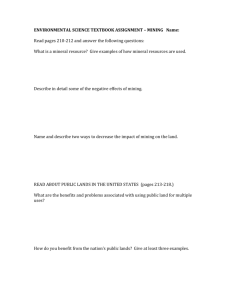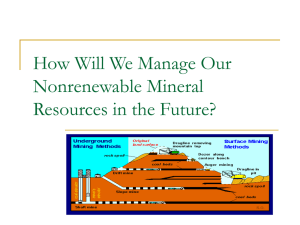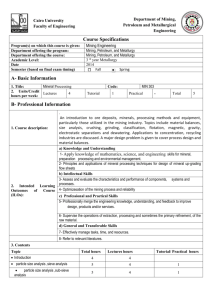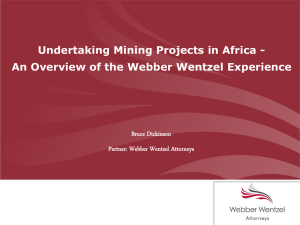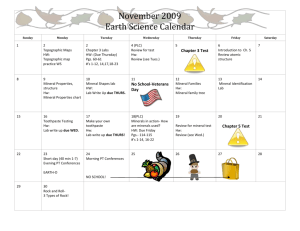RECOMMANDATIONS
advertisement
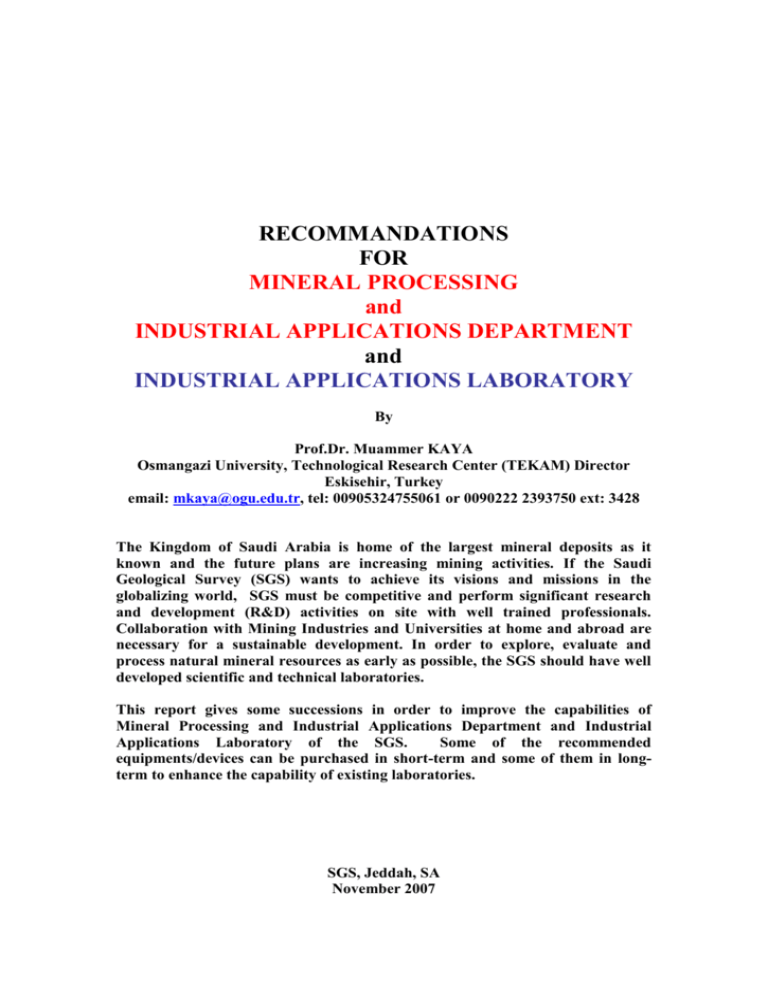
RECOMMANDATIONS FOR MINERAL PROCESSING and INDUSTRIAL APPLICATIONS DEPARTMENT and INDUSTRIAL APPLICATIONS LABORATORY By Prof.Dr. Muammer KAYA Osmangazi University, Technological Research Center (TEKAM) Director Eskisehir, Turkey email: mkaya@ogu.edu.tr, tel: 00905324755061 or 0090222 2393750 ext: 3428 The Kingdom of Saudi Arabia is home of the largest mineral deposits as it known and the future plans are increasing mining activities. If the Saudi Geological Survey (SGS) wants to achieve its visions and missions in the globalizing world, SGS must be competitive and perform significant research and development (R&D) activities on site with well trained professionals. Collaboration with Mining Industries and Universities at home and abroad are necessary for a sustainable development. In order to explore, evaluate and process natural mineral resources as early as possible, the SGS should have well developed scientific and technical laboratories. This report gives some successions in order to improve the capabilities of Mineral Processing and Industrial Applications Department and Industrial Applications Laboratory of the SGS. Some of the recommended equipments/devices can be purchased in short-term and some of them in longterm to enhance the capability of existing laboratories. SGS, Jeddah, SA November 2007 Mineral Processing and Industrial Applications Department Mining Engineering in its broadest context is devoted to the extraction of raw materials/minerals and solid fuels from the earth crust. The scope of mining engineering/activities ranges from the exploration for a mineral deposit through the finding, proving, developing, mining and mineral processing to marketing the product. Each step requires a specialized knowledge of many branches of engineering and sciences. Mining, being one of the primary industries of human civilization, will continue to play a leading role in bringing prosperity to nations. The activities in mining operation can be divided into three steps: prior to mining, during mining and subsequent to mining. Prior to mining, mineral deposits should be found (regional geology, geo-chemistry, geo-physics, drilling, sampling); proved (close drilling, shafting and tunneling, evaluation); planed (selection of mining method & facility requirements, design and engineering) and opened&developed (shaft sinking&tunneling, stripping, underground&surface construction). During mining (breaking, loading, transportation and cost control), surveying, stability of excavations, design&engineering, maintenance, supply services, power, health and safety, ventilation, water control and reclamation are important issues. Subsequent to mining, mineral processing (i.e. conversion of mineral raw materials to consumer products) and marketing (i.e. products for fabrication or other end uses) are main operations. Scope of mineral processing includes size reduction, classification, concentration, beneficiation, mill&plant design, smelting&refining, environmental control etc. Scope of marketing covers establishment of grades, standards&specifications, material science&technology, properties&uses of mineral products and sales channels. At the Saudi Geological Survey, Department of the Mineral Processing and Industrial Applications (MPIA) should concentrate on the mainly mineral processing and also maybe marketing steps of mining activities. Department can promote the development of mineral resources of the Saudi Arabia by providing engineering knowledge, technology and training for the mineral industry required by the growing mining industry Mineral Processing and Industrial Applications Department of SGS should have more personnel. It will be necessary to employ more Mining Engineers, Mineral Processors, Chemical Engineers, Metallurgical Engineers and also some Geological Engineers to concentrate on the mineral processing problems of S. Arabia. I also believe that you may also need some technical and scientific consultancy and advisory from other countries. DEPARTMENT'S OBJECTIVES Mineral Processing and Industrial Applications Department is able to help to develop some natural mineral resources in S. Arabia. Feasibility studies of concentrators/mills, laboratory and/or pilot-plant scale tests for flow sheet development, mass balance calculations, metallurgical performance determinations with respect to grade and recovery, equipment sizing, selection and costing, scale-up from laboratory scale to plant scale studies, concentrator circuit design, simulation and modeling of unit operations, process automation and control, plant economy, operating and investment costs calculation using cost index. Department should also study on energy requirements/savings, separation technologies, open/closed circuit calculations, automatic process control and modeling in mineral processing, new mineral processing equipment design studies, mining/ quarrying waste recovery/evaluation and waste/scrap recycling technologies (for mining, paper, plastic, metals and electronic wastes/scraps), environmental issues/ codes for environment friendly mining operations and environmental impact assessments in S. Arabian mines. Also scientific research and development (R&D) work should be carried out within the Department in the following major research fields; Mineral processing fundamentals, mineral process engineering, tailings and effluent management. mine environment, mine economics, reclamation & rehabilitation etc. DEPARTMENT'S MISSION The mission statement of the Department is devoted to pursuit and application of best mining/mineral engineering knowledge for social, cultural, economic, scientific and technological development of our society/nation and mankind through achievements in developing sustainable mineral sources, research & development, consultancy and community service that are of highest international standards. In accordance with the above statement, the Mission of Department is to provide education, research, technical advices and consulting pertinent to the science and technology of mining engineering to the highest international standards. The department endeavors to prepare projects on vitally important subjects that provide safe, economical, efficient, environmentally and socially acceptable mining and processing of mineral raw materials. In pursuit of our mission, the department should adapt the following objectives: Provide our staff with a broad foundation in basic sciences, and engineering sciences needed to understand and quantify effectively the state-of-the-art mining engineering applications by Professional Development Seminars, Conferences and Short Courses. Provide our staff with a creative and global view of the technical knowledge pertinent to the wide spectrum of the mining engineering profession, with emphasis placed on general principles, problem-solving fundamentals and design techniques so as to develop within our staffs the ability to adapt themselves to changing technologies and to achieve lifelong learning and professional growth. Provide our staff opportunities through short courses to gain in-depth knowledge in some technical fields of their own interest. Develop the ability of our staffs to carry out projects and tests, collect and interpret data, and critically report results through "hands-on" laboratory experiences. Encourage our staffs to acquire computer skills in the areas of problem analysis, design, and information technology for solving mining engineering problems. Provide our staffs opportunities to develop effective written and oral communication skills, and to work effectively both individually and in a team. Stimulate our staff awareness and appreciation for professional and ethical responsibilities, health and safety features, societal concerns with regard to environmental protection, sustainable development, and contemporaneous broader issues facing the mineral industry. SUGGESTIONS FOR PERSONNEL Since S. Arabia is a rich country and has a very hot weather, it seems that most of the personnel working at the SGS (government offices) are reluctant to work hard. Since the business hours are 7:30 to 15:30 and weekends are on Thursday and Friday (which are working days for most of the countries in the world), effective working period in S. Arabia at the government offices seems to be low as compared to other countries. It may be better for S. Arabia to change its holidays from (Thursday and Friday) to (Friday and Saturday). It seems that there is a very good relation between the staff of SGS. Most of the staff are friendly, warm, shares everything without any expectation, cooperative, traditional, related and open minded. But, religion has a very strong power in people's life. Like in any developing countries, there is need for promotion for the staff to motivate them. All Middle Easter countries should have REWARD and PENALTY system for employees. Hard working staff should get monetary and/or moral rewards, while lazy/inactive staff should get penalty or even firing/dismissal from the job. Reward and penalty systems are working very well in the USA and generate competition between employees. Hard working staff should be awarded by certificates, extra vacations, participation to the International Conferences/Congresses/Seminars or even extra money for encouragement. It seems that there is another problem of over-employment at the SGS. At crowded offices, people become more reluctant for work. It will be much better if you have less people working at the SGS. But the staff should be selected for the job; not the job selected for staff. Advancement in the job should be according to experience, education, knowledge etc. I believe that at the SGS, there is a need for training some of the personnel with Professional Development Seminars or Continuing Education for lifelong learning to initiate the competition between staff. If there is any demand for scientific consulting and technical advising, I am and my University are always ready to cooperate on all subjects in the future.
